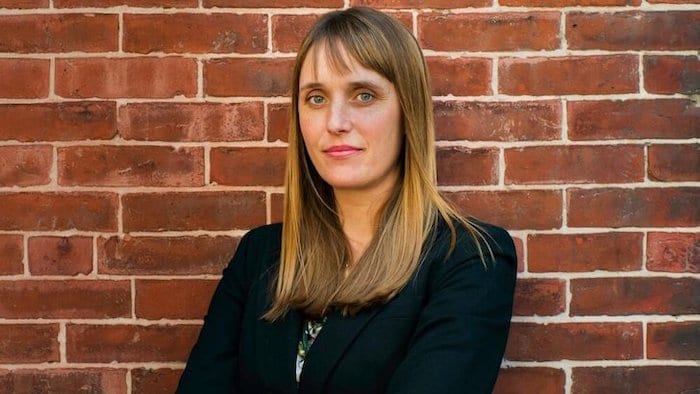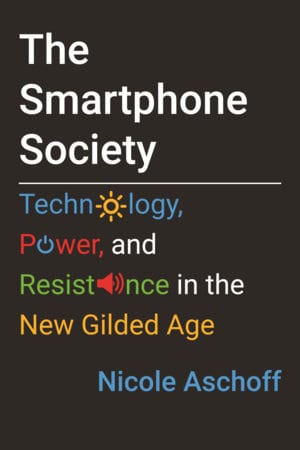
Aschoff moves beyond moral panic and asks bigger questions about power and control
When questions about smartphone use arise, there are two kinds of respondents: those who come clean about their chronic abuse, and filthy stinking liars.
Frankly, both sorts would be prudent to lean into The Smartphone Society, which dives deeper than regrets and fears in order to explore the meaningful connectors between our incessant “texting the babysitter and getting back a snap of the munchkin on the swing,” “Bumbling a divorced accountant in Hoboken,” and “drooling over a ’67 Airstream on Craigslist and using Petzi, a smartphone-controlled pet cam.” For Jacobin Editor-at-Large Nicole Aschoff, the question isn’t whether “hand machines,” as they’re called in China, are simply bad or good, but rather about how people can gain control of these ubiquitous remotes.
America is “at the start of a new chapter,” writes Aschoff, who has taught at Boston University and currently edits for the Boston Institute for Nonprofit Journalism, where I am editorial director. “Like the automobile,” she continues, “the smartphone has become a defining feature of modern society.”
With that concept as her driving force, Aschoff thoroughly examines various figures and trends, then addresses intersecting concerns such as access, surveillance, and decentralization as they apply to the larger themes of power and control. There’s a lot of beauty (“political constellations seamlessly blending digital and analog actions and organizing”), as well as an adequate amount of worry (“nodes in a vast unknowable network sending packets of information through the cloud”).
I spoke with Aschoff ahead of our discussion about The Smartphone Society at Harvard Book Store next Wednesday.
What did your game plan look like at the beginning? And what did it end up looking like? Was there an elevator pitch?
The elevator pitch was this idea that the automobile was the defining commodity of the 20th century, and the smartphone is the defining commodity of the 21st. The reason why I make the connection to cars or automobiles is because when you think about a car, like the ways that we make cars, and use cars, and regulate cars, and that being a part of all these changing norms—it makes sense to you. It’s not just this piece of machinery, but how we can understand societal change by looking at the car. Smartphones are kind of similar. When we look at them we can say, I spend too much time on my phone, or, I never really think about my phone, but if you start to look more carefully, and say, How did people use their phones? How are phones a part of politics now? or How are companies designing phones to make money? you can start to see what’s happening in society around us.
 As large as they loom in our lives, with the kind of [economics-focused] writing that you do week in and week out, did this feel like something that was always there in the background without necessarily being mentioned directly?
As large as they loom in our lives, with the kind of [economics-focused] writing that you do week in and week out, did this feel like something that was always there in the background without necessarily being mentioned directly?
Particularly with technology, it becomes super seamlessly integrated into your life and you stop thinking about it. But when I was teaching at Boston University, I used to use the example of smartphones to teach my students all kinds of things because they all had a smartphone and this kind of relationship with it. I’d say, OK, let’s look at how the smartphone is produced globally. What’s the global value chain? When we start looking at it, then we can begin to understand power, and we can understand global capitalism by looking at our phones.
It’s also something unique. We don’t want to just say there’s nothing special about our smartphones. There is, and I sort of tease that out to not fall into this trap of technological determinism, which I think we have to really be careful about and not just say the smartphone is causing us to be dumb, or the smartphone is destroying politics or democracy. Instead of that, I’m saying there is something going on here, and part of that is there’s this computer that’s connecting us 24/7 to these big corporations and also our governments, and it’s important to think about the implications of that.
How did you feel in general about the research you came across and ultimately dug into? Did it seem like a lot of people were trying to go straight to the point that excessive smartphone use is bad?
I think there’s a real tendency to resort to moral panic, particularly when we’re talking about politics or our kids, or just feelings of alienation and anxiety about social media. People are really quick to say, What’s different? Oh, we’re all carrying around new smartphones and using them all the time, so that must be the cause of these fears and problems. Which is natural. If you look back at the history of the automobile—and this could be movies or phones or radios too—these kinds of defining technologies really caused a lot of moral panic. Not that there’s nothing to fear, but I’m trying to understand that fear within a broader framework of power.
This topic has come in waves, and I especially recall reading heaps about smartphones and political uprisings during and immediately after the Arab Spring and Occupy Wall Street. Going through a lot of those texts, is there anything that writers five and 10 years were getting especially wrong on the topic?
What was probably a little bit less clear at the time was how phones are a pathway to this new mode of profit-making connected to the plan to make money off of commodifying all of these new spaces. It’s very much seen as a tool, but the less positive elements are only becoming clear in the last few years. Now there’s this tension of it still being useful as a tool but also understanding our relationship to tech companies and how they’re using our data and algorithms to control social media, and the impact this has on politics. If anything, the understanding has become a bit more nuanced, but the understanding was there in earlier writings.
How about yourself? How much of a smartphone user are you?
I think I’m in the middle. I didn’t get a smartphone until 2014—a lot of people already had one by then. I carry my phone with me everywhere, and I use it for maps, and I text people all the time, but I don’t use my phone for [social media]. Phones and social media are inseparable, so I’m very cautious about how my way of perceiving the world is impacted by social media. With growing daughters, I want to think about what kind of example I’m setting for them. A lot of parents like to panic about how their teens are hooked to their phones, but that’s because they’re hooked to their phones. They’re modeling your behavior. Of course, I’ve grown more skeptical as I reported the book.
There’s a lot of research and observations here from other countries. Is all smartphone use elsewhere relevant to smartphone use here? Certainly there are differences, starting with the timelines of when technologies became available. My main question to this point, however, is how unique smartphone use is overall from country to country. Is there one smartphone society? Or are there many?
I had hoped to write a more expansive book about the whole world, but as soon as you start thinking about how people are using smartphones, you see real differences from country to country and even region to region. In some sense, there is not one smartphone society. However, when we think about the fact that our phones are made by a handful of companies and we use a handful of the same apps in every single country, you’re looking at similar relationships with the companies that create these apps. One of the reasons I spent a lot of time talking about that in the book is because of this very unequal relationship with power.
Are some concerns—like surveillance—so grave that they posed the risk of hijacking your narrative as you explained them extensively?
It can hijack the narrative, and you can feel totally disempowered, [the feel of] no matter what I’m doing, I’m being tracked on my phone 24/7. That’s kind of the sentiment that both the government and these tech companies would like you to have—this feeling of powerlessness. And that’s the reason I try to keep a positive tone in the book. In the chapter where I talk about people who are fighting back, I write about how we control this technology. It’s not like we can’t demand a different political relationship with our government. It’s not like these algorithms are just put on Earth by God. They’re created by people. We can demand control, but first people have to understand what the landscape is, and what the demands are. At this point, I think we’re starting to formulate those demands.
I’m not an anti-technology person, but we have to think about the impact that we’re having on the world around us, and also about the kinds of relationships we’re building and how phones often exploit people—whether they’re the people making the phones, or the ones delivering the package when we pushed the button on the app to get the thing immediately from Amazon.
THE SMARTPHONE SOCIETY AUTHOR NICOLE ASCHOFF IN CONVERSATION WITH CHRIS FARAONE AT HARVARD BOOK STORE, CAMBRIDGE. WED 3.11, 7PM.
A Queens, NY native who came to New England in 2004 to earn his MA in journalism at Boston University, Chris Faraone is the editor and co-publisher of DigBoston and a co-founder of the Boston Institute for Nonprofit Journalism. He has published several books including 99 Nights with the 99 Percent, and has written liner notes for hip-hop gods including Cypress Hill, Pete Rock, Nas, and various members of the Wu-Tang Clan.

